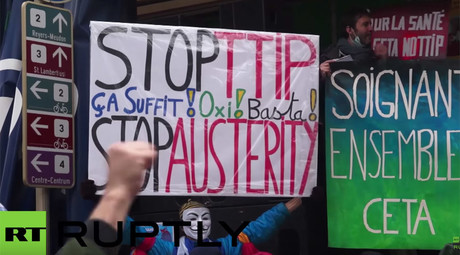“I want to be clear: it will not succeed if it does not guarantee that the standards we have in France for our citizens’ health and environment will be maintained,” Valls said at a government-organized environmental conference in Paris on Tuesday. “And today we are too far from that to envisage an agreement.”
The prime minister’s comments come just one day after the US and European Union began a 13th round of talks in New York, the latest in negotiations which have been ongoing since 2013. The current talks are expected to last a week.
It also comes just a day after US President Barack Obama pushed the free-trade deal during a visit to Germany, citing Chancellor Angela Merkel’s willingness to go ahead with the agreement.
“Angela [Merkel] and I agree that the United States and the European Union need to keep moving forward with the Transatlantic Trade and Investment Partnership negotiations,” Obama said during a joint press conference with the German chancellor.
“I don’t anticipate that we will be able to have completed ratification of a deal by the end of the year, but I do anticipate that we can have completed the agreement,” he added.
However, France’s minister of state for foreign trade, Matthias Fekl, did not share Obama’s optimism on Tuesday. When asked whether a deal might be reached before the end of Obama’s term in 2017, he told RTL: “No, I don’t think so. The likelihood, or risk, of reaching any accord is fading.”
“I don’t see Europe having to follow the US,” said Fekl, who is leading the negotiations for France. “The world’s biggest economic grouping is Europe, the biggest grouping in value and weight in world trade is Europe. Europe should make its own voice heard.”
French President Francois Hollande stated earlier this month that Paris “could still say ‘no’” if it finds the conditions of the agreement unsuitable.
READ MORE: EU Parliament backs TTIP resolution
Supporters of TTIP stress that the agreement would create the world’s largest free-trade zone, arguing that it would form a more integrated marketplace and help small businesses by opening up markets and making customs processes easier. They also say it would reduce trade tariffs on products.
However, the proposed deal is hugely controversial among some Europeans, who say it would elevate corporate interest above national interest, arguing that international corporations would be given power at the expensive of small and medium-sized businesses. The secrecy surrounding the negotiations has also come under fierce criticism.
Just one day before Obama’s visit to Germany, thousands of anti-TTIP protesters hit the streets of Hanover to protest the deal. The large turn-out is perhaps unsurprising, considering a recent YouGov poll which found that only 17 percent of Germans think TTIP is a good thing, down from 55 percent two years ago.
The numbers are similar in the US, despite Obama’s support for the agreement. Only 18 percent of Americans believe TTIP is a good thing, compared to 53 percent in 2014.
Source Article from https://www.rt.com/news/341019-ttip-agreement-france-us/?utm_source=rss&utm_medium=rss&utm_campaign=RSS
Related posts:
Views: 0
 RSS Feed
RSS Feed

















 April 26th, 2016
April 26th, 2016  Awake Goy
Awake Goy 
 Posted in
Posted in  Tags:
Tags: 
















